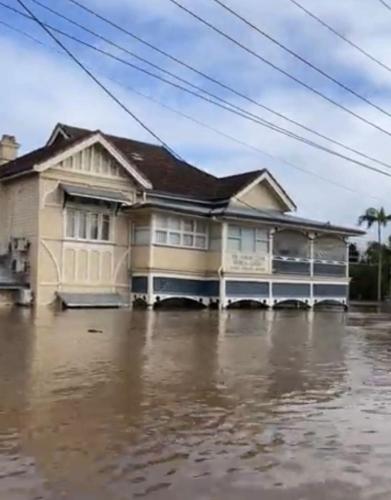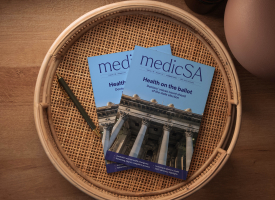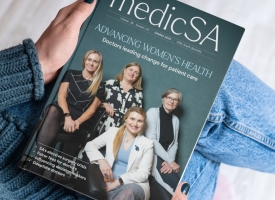Healthcare after Lismore floods and hospital capacity
AMA Transcript: Professor Steve Robson on ABC News Radio Drive, Wednesday 7 December. Subject: Access to healthcare after floods and other natural disasters and public hospital capacity

HOST: Well, there are fresh calls for federal and state governments to do more to help boost healthcare services in communities that are recovering from natural disasters, and there's been a few of those. The Australian Medical Association is behind the push, claiming that two and a half months on from the devastating flooding in northern New South Wales, nothing's been done to assist health care providers in the region.
To look at the impact of that we're joined by President of the AMA, Professor Steve Robson. Good afternoon.
STEVE ROBSON: Good afternoon, Glen.
GLEN BARTHOLOMEW: You've singled out that flood hit New South Wales city of Lismore as an area of particular concern. Just how are health services coping there at the moment?
STEVE ROBSON: The residents of the Lismore area have had a terrible time. They had a dreadful flood at the beginning of the year that was of historically high levels, and the flooding wiped out a number of health facilities, general practices and pharmacies right in the middle of town. And of course those are expensive things to replace.
And while many other businesses and activities have been eligible for emergency funding, for reasons I can't quite get my head around, the state government has not considered health practices to be eligible for these emergency grants. So they are getting close to a year down the track, yet to be up and functioning properly again.
I personally visited the area a few months ago and it was really mind blowing what had happened to the area. So we think it's high time that the residents of Lismore and the surrounding area were able to get back to the health care that they all need, to get the health services like pharmacies and medical practices up and functioning again.
GLEN BARTHOLOMEW: How widespread is the damage to healthcare facilities there, for example?
STEVE ROBSON: Well, in the downtown area of Lismore, everything was truly wiped out, and it's meant rebuilding from scratch all of the facilities within the buildings and so on that were flooded. But I guess the broader principle that is of concern to us is that we are seeing increasing severity and frequency of these natural disasters. We've seen further flooding around the country - more in Forbes for example, we're seeing bushfires.
And the principle really applies that once these natural disasters occur, they have such a profound effect on a lot of the health infrastructure that we think this really needs to be prioritised. That health facilities, pharmacies, all of the places that the residents go to have their health care managed need to be prioritised for funding to get them up and running again. And we're not seeing that.
We think in view of climate change and what's happening with natural disasters, it should be something well and truly on government agendas, Glen.
GLEN BARTHOLOMEW: What impact is this then, having on patient care and access to medical assistance in some of these areas? What are these people doing?
STEVE ROBSON: Well, it's a really very, very good question. And in Lismore, general practices for example, they've lost a lot of their equipment. They've had to set up in very temporary surroundings with greatly reduced services operating. They have tiny facilities that make it very difficult to get through the number of patients.
So patients are having to travel to different towns to get the routine care, to seek medical supplies and so on. And I was speaking to doctors from towns elsewhere in the region, people are having to drive between towns to get routine health care because they just don't have the ability to seek care because the general practices where they are, are not functioning properly.
GLEN BARTHOLOMEW: So what is the view? If you say you can’t quite understand why these facilities don't qualify or aren't eligible for some of those assistance grants, who does the state government think is going to repair them?
STEVE ROBSON: Well, it's an incredibly good question. As one example, I was speaking to one of the pharmacy owners who ran a pharmacy right in the middle of Lismore. They were wiped out and lost all of their stock and the best they could get was, I think, a grant of about $50,000. And I said, well, what does that buy you? And he said, well, it will probably get me one shelf of breast pumps, and that's all. So they've got stock that's completely lost.
As you know, there are huge insurance difficulties with these natural disasters. And moving forward, it may be almost impossible to insure for losses in areas. But that doesn't mean that people who live there don't need to get pharmacy supplies, get general practice visits, immunisations, sick children, all of the things that go on unabated while there's wrangling with the government and insurers to sort out these problems. It's really heartbreaking on the ground.
GLEN BARTHOLOMEW: Floods currently predicted to hit communities in South Australia's Riverina region, the next part of the country to suffer from some of these natural disasters. What are the lessons that should be learnt from all of these recent events in eastern Australia?
STEVE ROBSON: I think the lessons are really simple, and that is healthcare is fundamental to a community functioning, particularly in the aftermath of a natural disaster. And if you have a flood, if you have a bushfire, if you have some natural disaster come through and wipe out doctors' practices, areas of hospitals, pharmacies, all of the things that are so vital to a community functioning properly, then the government needs to prioritise these. It needs to adequately fund the rebuilding, it needs to put in place services that can help the local community until the services are back up and running again and prioritise it. And we've seen no evidence at all that the State Government in New South Wales, for example, has put any priority at all. We had a very big meeting and call months ago. There's been absolutely no action at all, and it really is heartbreaking for all of the people around Lismore and increasingly people in areas that are subject to natural disasters right around the country.
GLEN BARTHOLOMEW: Hard enough to attract doctors and medical facilities to some regional areas of the country. You wouldn't want them leaving as a result of something like this. While I've got you, in other news today, new data shows elective surgery rates in our public hospitals have hit their lowest levels in 10 years. What's going on here? What's behind that drop?
STEVE ROBSON: Well, we know that for a long time there a lot of state and territory governments have had difficulties in getting through the elective surgery that's required for the population. But we saw the staggering figure released overnight from the Institute of Health and Welfare that there were 135,000 fewer operations done this year. Now, this is staggering. It is 135,000 people who have problems seeing, problems moving, difficulties of working, chronic pain, all of these things that are just not being addressed. It's not only an issue of compassion. We don't want people in the community to be in pain, unable to function, but it even it doesn't make any economic sense. These are people who potentially can't work, can't travel, can't spend, can't contribute to the economy. So it just makes no sense on any level, either compassionate or economic, to let the rate of elective surgery slide. And we know that it's been a problem for a long time. It has been exacerbated, but I don't think we realised just how bad it was going to be until the figures came out last night.
GLEN BARTHOLOMEW: Victorians being warned to brace for another couple of weeks of delays, or another week at least to elective surgeries, as that state's two major trauma hospitals paused or postponed some operations because of what they say is a workforce shortage caused by the latest COVID-19 wave. What needs to happen to increase public hospital elective surgery capability now and in the future?
STEVE ROBSON: So it's an incredibly good question, and it's important for state and territory governments around the country to come to grips with this. We have low resourcing and a neglect of the public hospital system for many years. And of course, this has now been thrown into further chaos with the COVID pandemic. Hospital capacity is filled with people who are being treated for COVID and COVID related conditions, and also the staff who provide the care - the doctors, the nurses, all the people in hospitals who provide the care to those patients - are now affected by COVID themselves. And it is just making the problem worse and worse and worse. So I think we're at a point now where the waiting lists not only to get an operation, but to see a specialist in a public hospital in the first place to even get on a waiting list, have just blown out to biblical proportions. We've never seen anything like this before. It needs to be taken seriously. There needs to be resourcing, and we need to understand that COVID waves have a major effect on the healthcare system, and they affect people not only who get COVID, but people who are waiting for other care, and the dominoes fall through the health system. So we really need a national approach to this- we need to sort this out.
GLEN BARTHOLOMEW: Prognosis negative. Professor Robson, thanks very much for joining us.
STEVE ROBSON: It's a pleasure, Glen.



